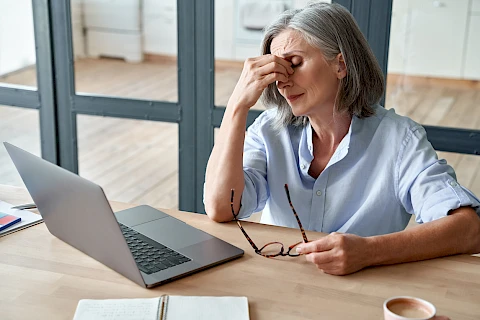
One often overlooked health concern among seniors is eye strain. It is an issue that can affect older adults even when they already use glasses or contacts. Preserving your vision is paramount to maintaining independence and quality of life as we age. Understanding the factors contributing to eye strain and implementing practical strategies to alleviate it can help safeguard your eye health for years to come.
What Is Eye Strain?
Eye strain, or asthenopia, emerges from prolonged and intense use of the eyes, such as staring at screens or reading for extended periods. This includes staring at screens or reading for extended periods. The eyes naturally change with age, causing the eye muscles to weaken. This can exacerbate discomfort and eye strain, even for seniors who already use corrective measures, as their eyes undergo age-related changes.
Symptoms of Eye Strain
Eye strain can manifest through a variety of symptoms. You might experience sore, irritated, dry, or watery eyes, difficulty focusing, blurred or double vision, and increased light sensitivity. In some cases, you may also experience headaches or pain in the neck or shoulder region. It is essential to note that these symptoms may become more pronounced or frequent with age, and your vision naturally degrades.
Causes of Eye Strain in Seniors
Several factors can lead to eye strain in seniors. Dim lighting when reading or doing close work, poor posture during these tasks, and pre-existing vision problems can all contribute. Technology, of course, also makes screen time a significant factor. Prolonged periods spent looking at screens, including TV, computer, or smartphone, can cause eye strain.
Preventive Measures for Eye Strain
Avoiding eye strain involves conscious changes to your habits and lifestyle. Here are a few things you can do:
Use Adequate Lighting
Make sure you are working with adequate lighting at all times. Position lighting behind you for focus work like reading or crafting. Adjust the brightness level on computer screens if necessary and use filters on devices to reduce glare.
Take Regular Breaks
Take regular breaks when engaged in tasks requiring close focus. Practice the well-known 20-20-20 rule. Every 20 minutes, take a 20-second break and look at something 20 feet away to allow your eyes to rest and refocus.
Get Your Eyes Checked
Regular eye check-ups can provide early detection of any vision problems. Your ophthalmologist looks for subtle changes in your vision. They can identify signs of potential eye disease to ensure prompt intervention and treatment. Treatments may range from corrective eyewear, eye exercises, or more specialized treatments for underlying conditions causing eye strain.
Maintain Eye Health Routines
Simple practices like wearing sunglasses outdoors to protect from UV rays and using artificial tears to prevent dry eyes can also help keep your eyes healthy. Maintaining a healthy diet rich in vitamins A, C, and E is also ideal.
Get Personalized In-Home Support From Senior Helpers
Prioritizing eye health is essential for seniors to maintain their quality of life in their golden years. With the right strategies, you can reduce the risk of eye strain and discomfort associated with age-related changes.
Senior Helpers offers a wide range of personalized, in-home senior care services, serving older adults in the Crown Point, Gary, Hammond, and East Chicago areas. Contact us anytime at Senior Helpers Northwest Indiana to find out how we can ensure your senior years are comfortable, healthy, and fulfilling.